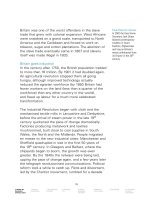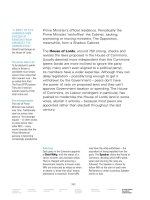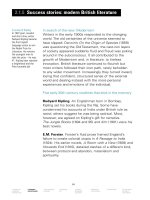Speak the culture britain be fluent in b 349
Bạn đang xem bản rút gọn của tài liệu. Xem và tải ngay bản đầy đủ của tài liệu tại đây (34.13 KB, 1 trang )
8.4 Cashing in: the economy, wealth and social security
Long since overtaken as the world’s leading economy,
and destined to be outpaced by the BRIMC countries
(Brazil, Russia, India, Mexico and China) in the 21st
century, the British economy, nevertheless, still
punches well above its weight. Britain harbours less
than one per cent of the world’s population, yet
remains sixth in the world rich list (measured by GDP
at purchasing power parities) and accounts for over
three per cent of world output. As individuals, the Brits
are less well off. The heady days of the 1860s, when
they had more money in their pockets than anyone
else, are long gone; in 2007 the International Monetary
Fund ranked Britain 28th for GDP per head.
How Britain grew wealthy
The Industrial Revolution made Britain rich, fed by the
captive markets of a sprawling Empire and a large,
new labour force at home. By the mid 19th century,
Britain was by far the world’s biggest producer of
consumer goods and capital equipment. The major
cities mushroomed around particular industries:
Glasgow and Belfast had their shipbuilding; Newcastle
its coal; Sheffield its steel; and, later, Birmingham and
Coventry their automotive industries. The products
were shipped around the globe from vast docks in
London, Liverpool and Bristol. When manufacturing
declined in the 20th century, the attendant industrial
cities declined with it. Their reinvention in recent
decades has enjoyed mixed success. Leeds and
Manchester, former centres of the textile industry,
have become a leading financial centre and mass
provider of higher education respectively. Other cities,
like Glasgow, Newcastle and Liverpool rely on heritage
and culture for much of their modern verve.
Bully for Belfast
By the late 19th century
Belfast was producing
more linen than any other
city in the world; people
called it Linenopolis. It also
had the largest shipyard
anywhere, responsible for
building giants like the
Titanic. In addition, the city
became the world’s prime
manufacturer of rope and
oversaw the birth of air
conditioning.
339
1. Identity: the
foundations
of British culture
2. Literature
and philosophy
3. Art, architecture
and design
4. Performing
arts
5. Cinema,
photography
and fashion
6. Media and
communications
7. Food and drink
8. Living culture:
the state of
modern Britain









